Menu

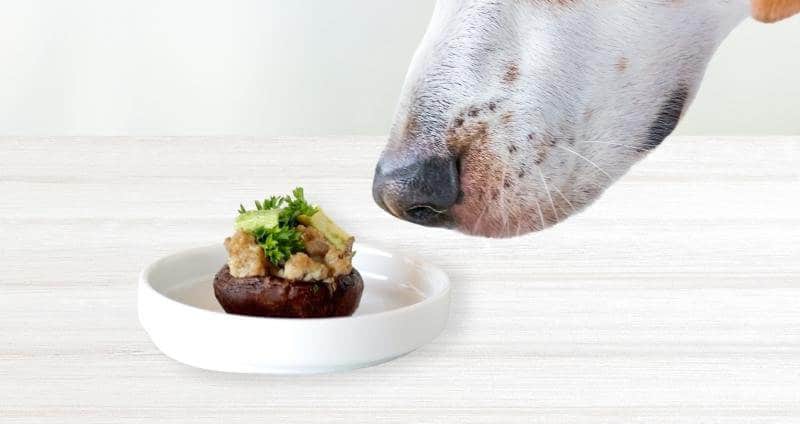
The short answer to “Can dogs eat cooked mushrooms?” is YES! It contains plenty of nutritional value that can be a great addition to your furry friend’s diet, especially if you want something that can support their immune and cardiovascular health.
Mushrooms contain protein, fiber, minerals (such as selenium), vitamins B, C, and E, and are low in digestible carbohydrates and total fat. The indigestible carbohydrates and soluble fibers in mushrooms also support the health of the microbiota to promote gut health.
This article will cover the health benefits of feeding mushrooms to your pets and provide three nutrient-dense mushroom recipes for your furry friend.

When you’re cooking that savory mushroom dish for yourself, consider setting some aside for your dog.
The general rule of thumb is that if a mushroom is safe for humans, it will be safe for dogs. Therefore, any store-bought mushrooms you buy at the grocery store or trusted farmer's market should be appropriate for your dog.
For example, the humble button mushroom is high in nutritional value and can be a great addition to your pup's diet.
Don’t let the sections above give you the automatic go-signal to feed your dogs just any kind of mushrooms, especially wild ones. The chances of your dog finding a poisonous mushroom due to their foraging nature are not that unlikely, so pay attention when bringing your dog on hikes or walks.
Avoid feeding mushrooms you’re unfamiliar with, especially since mushroom poisoning among dogs is difficult to diagnose. Mushroom toxins are hard to identify, with some mushroom species inducing mild to deadly symptoms.
Some symptoms of mushroom poisoning in dogs include:
Never feed mushrooms to your dog unless you know exactly what type of mushroom it is and confirm that it’s safe for human and dog consumption.
It’s best to do your research and only buy mushroom products that are veterinary-certified to be pet-friendly for your furry companions.
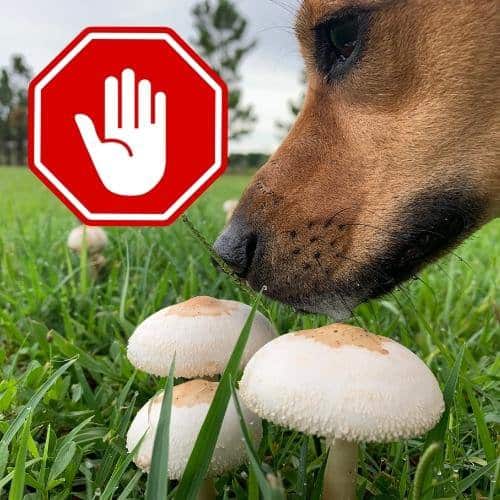
If your dog finds and eats mushrooms in your backyard or while out on a walk, call your veterinarian immediately. Mushrooms can pop up overnight in your backyard, and many of these wild mushrooms could be poisonous to your pet.
Your veterinarian may suggest you call the Pet Poison Control Hotline: 800-213-6680. Besides helping you identify the potential species of wild mushroom your dog ate, they may be able to safely remove them from your home.
Photographing the area where the mushrooms were found can also be helpful in identifying their species.
If possible, try to find some pieces of the mushroom your pet ate and have them ready in a baggie should your vet or poison control want to see them.
Food Poisoning Protocols: If your pet vomits, you can also collect the vomit in a plastic bag. This can help identify the mushroom that was eaten and determine if it was poisonous.
Why give dogs mushrooms? Mushrooms have vast and far-reaching health benefits, and each variety of fungi has its own unique properties and organs they can support. There are, however, beneficial features of mushrooms common to all of them:
Mushrooms can be an abundant source of vitamin D2 when exposed to UVB light [1]. They are also home to unique antioxidants like ergothioneine and glutathione.
When mushrooms are consumed (as food or supplements), they activate a form of cellular communication in the body. The compounds in edible fungi inform the immune system to give attention to different physiological aspects to maintain balance and vigor.
How does this beneficial immune response occur? Mushrooms are rich in bioactive compounds called polysaccharides, which include beta-glucans.
Beta-glucans are anti-inflammatory, neuroprotective, anti-viral, anti-neoplastic, microbiome-supporting, and so much more. Some of the immune cells that beta-glucans interact with are monocytes, natural killer (NK) cells, neutrophils, macrophages, and dendritic cells.
In simple terms, mushrooms activate a “wake up and be alert system” in the body, and a message to send resources where needed. The message is “this isn't an emergency, but it could be, so be vigilant.”
More information on the specific way beta glucans & polysaccharides facilitate this “call to vigilance” can be found here.
If you decide to give mushrooms to your pet as an alternative to commercial dog foods, it’s recommended that you cook the mushrooms before serving. Doing so allows more of the healthy benefits of the mushrooms to be utilized.
Cooking mushrooms will also make them easier for your dog to digest. This is because all mushrooms contain a component called chitin, which resides in the cell wall of mushrooms.
Chitin is the same material that makes up the hard outer shell of insects and crustaceans [2]. The chitin that makes mushrooms difficult to digest is easily broken down by cooking mushrooms at a minimum of 200 degrees Fahrenheit for 10 to 15 minutes.
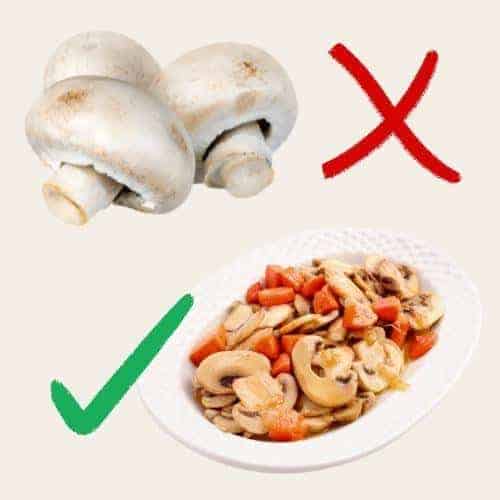
It’s actually almost impossible to overcook mushrooms, so feel free to cook them well.
We recommend adding mushrooms to bone broth and slow cook for a long time. You can add this mushroom-infused bone broth to your dog’s food.
Utilizing this hot water extraction method of cooking mushrooms breaks down the indigestible polysaccharides that make up the cell wall, which provides mushrooms’ substantial amount of immunomodulatory benefit [2].
Mushroom Facts: Learn more about the benefits of mushrooms for dog health in our article Can Dogs Eat Mushrooms? Facts About Fungi for Your Furry Friend.
Mushrooms are an incredibly versatile ingredient that can be found in various dishes. This remains true for recipes for dog food that your furry companions will enjoy, both in taste and nutritional value.
Here are three cooked mushroom recipes your dogs will surely love:
Bone broth is chock full of vitamins, minerals, and amino acids. The collagen from the bones can also support your pet’s joint health.
Adding mushrooms to this dish can enhance these benefits!
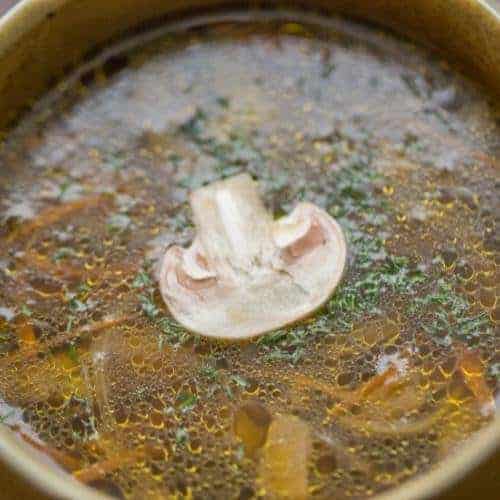
Ingredients:
Directions:
Note: **Do not feed the cooked bones to your dog**
This bone broth can be used as a “gravy” on top of your pup’s food. Dry kibble can be very hard on digestion, so adding this bone broth can add both nutrition and flavor to your dog’s food.
This delightful recipe for dogs was created by Dr. Suzi Beber [3].
Ingredients:
Directions:
This recipe was adapted from a Real Mushrooms stuffed mushroom recipe for humans by Renee Michael for her dog, Roscoe. You can easily make this dish in under an hour with ten minutes of prep time and 35 minutes of cooking time.

Ingredients:
Directions:
Depending on the size of your mushroom caps, you might have leftover turkey mixture that you can turn into turkey meatballs for your pup!
Find More Recipes: Have a doggie-friendly mushroom recipe or looking for inspiration from other pet owners? Please share it with our https://www.facebook.com/groups/realmushroomspets.
Can dogs eat mushrooms? Certainly.
But as a good pet owner, you need to feed mushrooms to your furry friends responsibly. Your dog’s health is a priority, so be cautious of wild mushrooms and know certain mushrooms you should avoid.
Do the research and try out different varieties to see what piques their interest. With the three recipes we shared above, we hope you can try and discover new ways to add more nutritious ingredients to dog food.
One way to ensure you’re giving your pet the right health benefits from mushrooms is by checking out our selection of pet-friendly mushroom supplements. Our products are made from 100% organic mushroom (fruiting body) extracts and come in different varieties, such as Lion’s Mane mushroom extract capsules to Maitake mushroom extract bulk powder.
Check out our pet-friendly mushroom supplements section today!

Disclaimer: The information or products mentioned in this article are provided as information resources only, and are not to be used or relied on to diagnose, treat, cure, or prevent any disease. This information does not create any patient-doctor relationship, and should not be used as a substitute for professional diagnosis and treatment. The information is intended for health care professionals only. The statements made in this article have not been evaluated by the Food and Drug Administration. Any products mentioned are not intended to diagnose, treat, cure, or prevent any disease. The information in this article is intended for educational purposes. The information is not intended to replace medical advice offered by licensed medical physicians. Please consult your doctor or health practitioner for any medical advice.

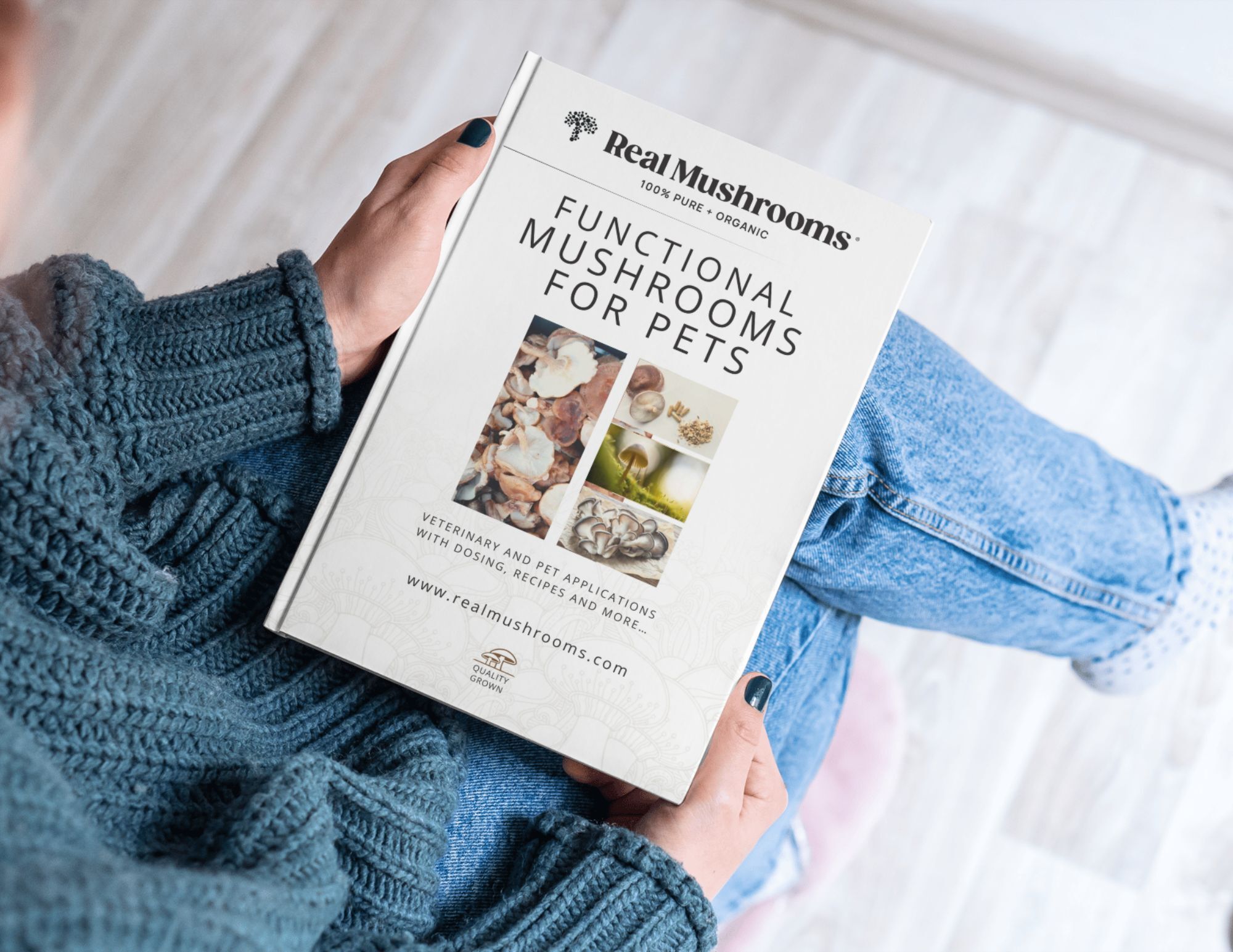
– Plus, Enjoy Exclusive Tips and Updates with Our Real Mushrooms for Pets Newsletter